Content Writing Tips for Beginners: A Step-by-Step Guide

Everyone has to start somewhere. With content writing, the place to start is with writing. While many content writers go to school for English or Marketing, or even a Writing-specific degree, it's certainly not necessary. There are plenty of successful content writers out there who have never had a day of writing-focused education, and many whose first language isn't English besides.
It's possible to be a successful content writer without training and certification, but it requires one thing: experience.
I consider myself a fairly proficient content writer, though I don't know that I'm among the best of the best. I'm knowledgable enough to distill some tips for you, though, and I can help you become a better content writer. Here are my tips!
 30 Second Summary
30 Second Summary
You can become a strong content writer without formal education - what matters most is getting experience. You need to read extensively to improve your skills and draw inspiration. When you write, you should pick topics you know well or are willing to learn about deeply. You have to keep your writing style consistent and pay attention to keywords, but don't obsess over them. You should format your content clearly with headings and lists so readers can scan it easily. Most importantly, you need to practice regularly to develop your unique voice.
Read, Read, Read
You aren't alone. You aren't writing in a vacuum. Every writer, and indeed virtually every creator of any kind of content, will tell you that the number one thing they do to keep themselves going is consuming media. Authors read. Video producers watch movies, TV, web videos, and streams. Illustrators take the time to consume art.
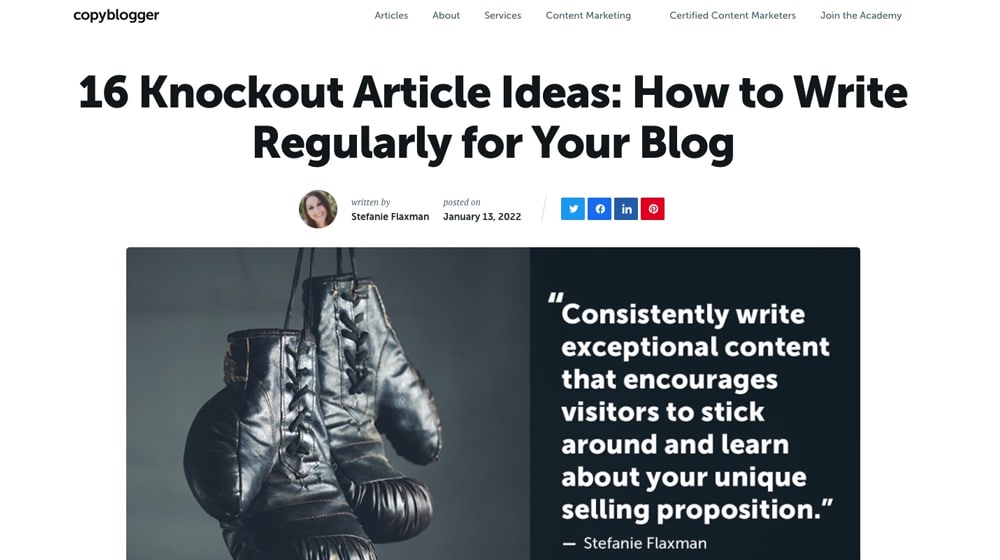
It's important to read with a critical eye, but also to read for pleasure. Read because you're interested in the topic, and read with an eye for the intricacies of writing. What perspective does the writer use? What tone have they adopted? How long are their sentences, their paragraphs, their sections, and their posts? How natural is their language? You can learn a lot just from reading.
Here are some key reasons why reading other content is essential for writing your blog posts:
- Inspiration: Reading other blog posts can inspire you by providing new ideas or perspectives on a subject; this can spark your creativity and help you think about how to approach your blog in a unique and engaging way. Inspiration doesn't have to originate from the content you read; I've thought of specific questions and topics after reading something that has nothing to do with the article I'm reading, and I wrote a blog post about it!
- Knowledge and expertise: Reading content from other sources helps you stay informed about your niche or industry. This knowledge can be invaluable in developing well-researched and credible blog posts. It also helps you better understand and address your target audience's needs and concerns. Trust me; writing confidently about a topic is challenging when you don't have much expertise. Reading content by other experts can speed up this process.
- Identify trends: By reading content from various sources, you can identify emerging trends and topics gaining traction in your niche; this enables you to write timely and relevant blog posts that cater to your audience's interests.
- Improve writing skills: Reading high-quality content exposes you to various writing styles, techniques, and structures; this can help you improve your writing by adopting effective strategies, refining your voice, and learning new ways to communicate your ideas.
- Understand audience preferences: By analyzing the types of content popular among your target audience, you can tailor your blog posts to meet their preferences; this can help increase engagement, readership, and overall satisfaction with your content.
- Learn from successful bloggers: Observing the practices of successful bloggers can help you identify what works and what doesn't; this can help you avoid common pitfalls.
Reading also gives you useful insights you can use in your own writing later. You accumulate facts, which you can pull out and use as citations later. You learn clever wordplay, new words you can use to spice up your own writing, and terminology common amongst professionals in your industry. You gain insight. So: read!
Know What You Want to Write
Depending on why you want to write, you may already have a goal in mind. I generally see people in a few categories.
- The people who want to start a blog because it's a way to make money, but have no guidance or goal in mind.
- The people who have a passion for a topic, and want to start a blog to turn that passion into something more.
- The people who have the ability or talent for writing (and have been told as much through their schooling years) and figure they might as well make a career out of it.
The first group is difficult because they have to spend time developing a niche, a topic, an interest that interests them. Choosing what to make a site about is very difficult, and it's even more difficult when you have to learn every aspect of the craft along the way.
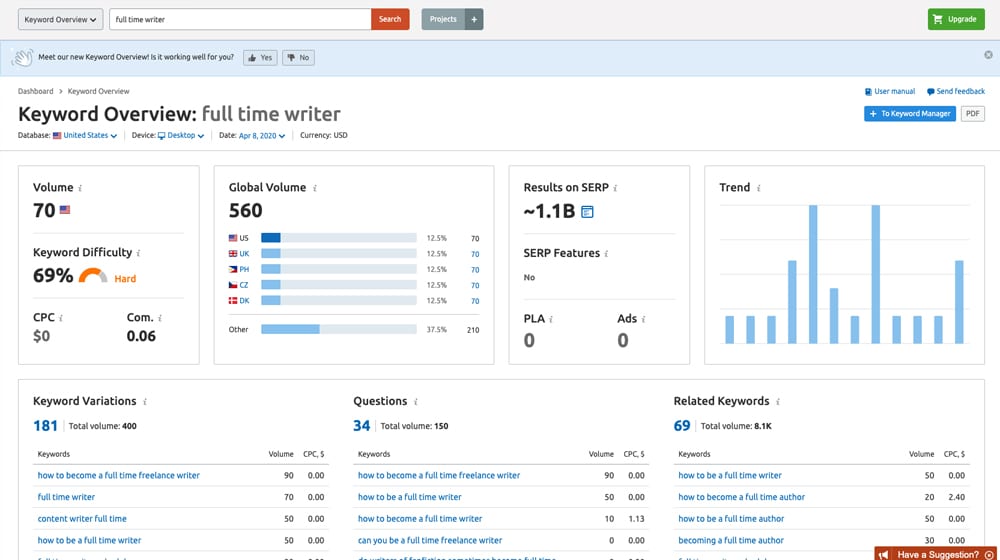
The second group is people who already know their stuff and just might need help putting their thoughts into writing. This is the kind of group most of my article here is aimed at, but everyone can get some use out of it.
The third group doesn't generally need help with the technical aspects of writing, but transitioning from the stuffy world of academic writing to the free-flowing world of content writing can be a shift that not everyone is equipped to deal with.
In any case, you need to know in a broad sense what you want to write about for your site, and in a narrow sense what you want to write about for a given article. I often start with some keyword research to develop a topic idea, write a killer title for that topic, and then create my outline for the article based on those search phrases and that topic.
It's worked well enough for me so far - writing articles that match real searches and catering to those searches is a great roadmap to getting your articles found.
Write, Write, Write
Believe it or not, I didn't start out writing great content. I spent years writing some pretty mediocre content, and I only stood out because a lot of the people also writing content in the same arena were so, so much worse. Like, you'd be surprised just how bad some of the people out there writing content are. Go to Textbroker and spend a few bucks on some 3-star articles and you'll see what I mean. Content mills are generally a wasteland.
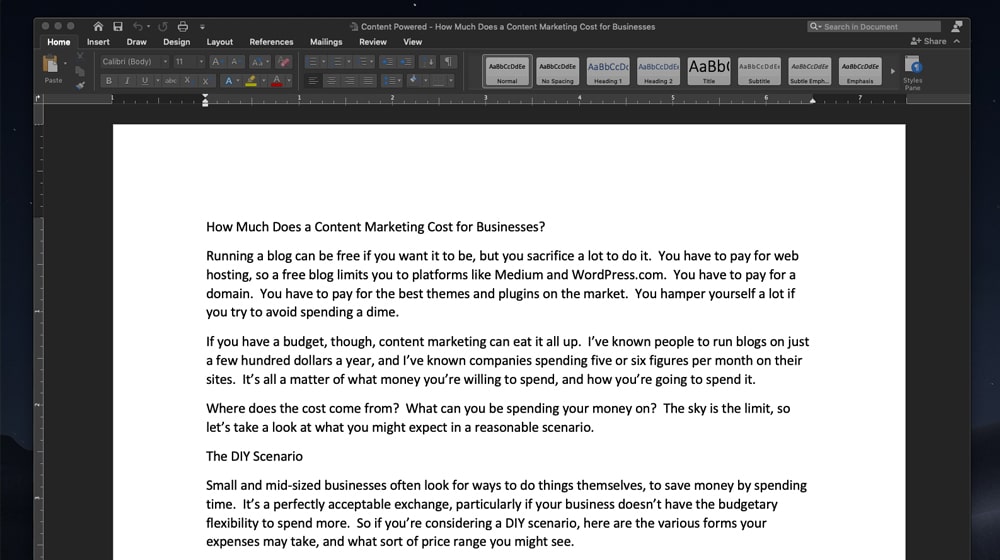
Part of successful content writing is just practice. The more time you spend writing, the more familiar you'll be with the process. The more details you'll be able to stick in your mind as you write. The better you'll be able to formulate posts as you go along. A post that might have taken me two or three hours to write a few years ago, I could write better in less time today.
Writing a lot and writing consistently is often cited as a key factor for blogging success. I'm not sure it's 100% necessary from a marketing standpoint, but I can tell you that it's extremely beneficial from a technical standpoint.
They say that practice makes perfect, and while there's no such thing as perfect, practice is always important.
Keep Tone, Voice, and Perspective Consistent
One thing I often see novice writers struggling with is perspective, tense, tone, voice, and all of those other subtle technical elements of grammar that come naturally with practice.
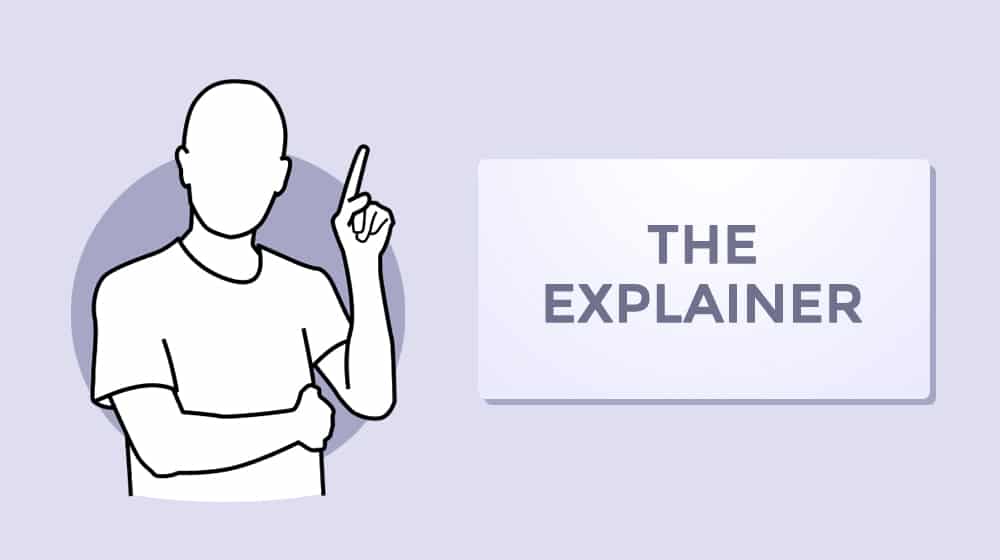
Here are some examples:
- Shifting between "I", "We", and "The Company" as self-referential signifiers. Know who you're representing when you write. If I write something for a client, I'll use a different voice than when I write something for myself.
- Shifting between the personal and the impersonal, as in going from "we recommend X" to "X is generally recommended." There's a time for different levels of formality; know which one you want to use.
- Referencing industry terms incorrectly. I see this a lot with freelancers who have to write for multiple industries; using terminology incorrectly makes people who know what they're talking about recognizing that you don't.
It doesn't really matter which perspective, which tone, which voice you use. What matters is that you keep it consistent throughout any piece you write.
Care About Keywords
A huge part of successful content writing online is caring about keywords. Keyword research is the core of every good blog post, most paid advertising, and a whole lot else besides. That's just how powerful Google is these days.
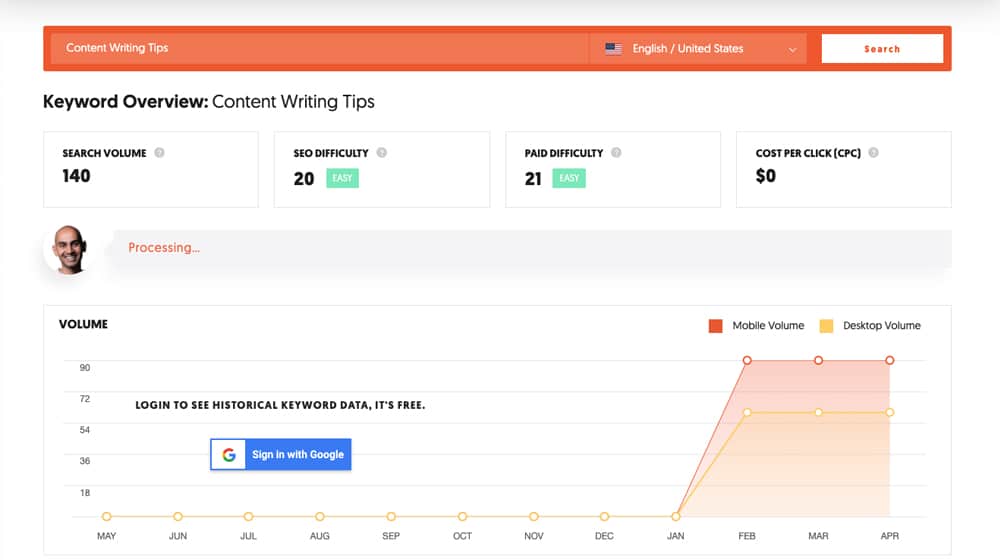
I'm not going to go extremely deep into keyword research here. It's a very detailed topic, and there are a lot of great guides out there already written to help people of all skill levels get started.
Suffice it to say that, in my mind and in my experience, keyword research is an essential part of good content writing. Knowing how Google interacts with keywords, how to use keywords appropriately, and how to write around awkward keywords is essential.
Don't Care Too Much About Keywords
Look, I know what I just said, and I know what I'm saying now.
The fact is, keywords are a lot less important than they were five or ten years ago. Back then, you needed to figure out exact, specific keywords and write posts with specific levels of keyword density to make sure your content thrived. Pick the wrong keyword and your content never shows up for high volume web searches. Use the keyword too little and Google doesn't think the post is relevant. Use it too often and you get dinged for keyword stuffing. It's a fine line to walk.
At least, it was. Then Google introduced a bunch of machine learning and semantic indexing features to their index. These days, Google will show you search results that don't even include a phrase you used when searching but are still relevant. They understand things like synonyms, variations on keywords, and so on.
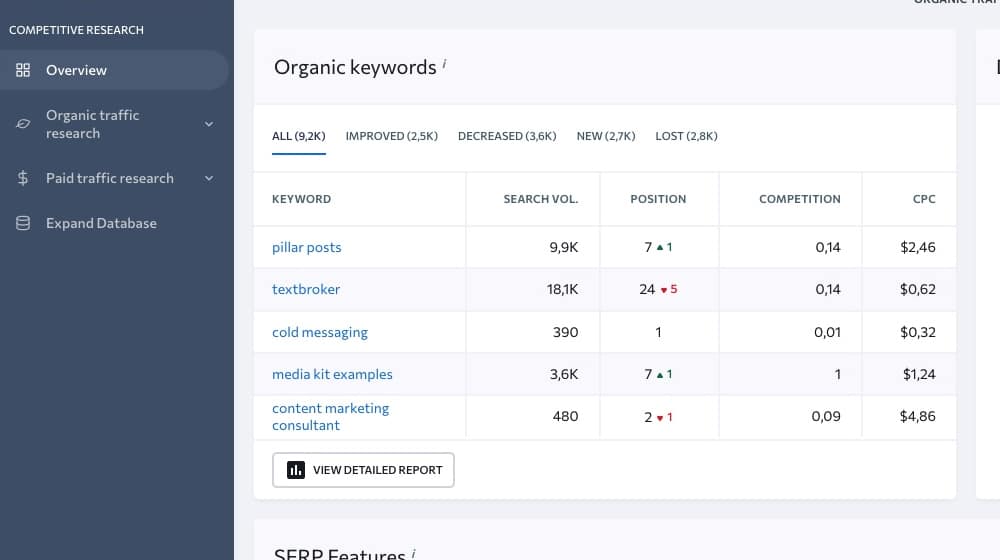
That's why these days, I don't worry too much about specific keyword usage - at least, not within the context of my articles. I use keyword research to guide the topics I choose to write about, and I might sprinkle in a specific keyword here and there when I find a way to work it in, but I'm not going to double over backward to include specific long-tail keywords in every post I write. Over-optimizing your posts like that can have the opposite effect:
"The idea is basically to try and level the playing ground a little bit. All of those people who have sort of been doing, for lack of a better word, 'over-optimization' or 'overly' doing their SEO, compared to the people who are just making great content and trying to make a fantastic site, we want to sort of make that playing field a little bit more level."
Heck, here's an example. This blog post uses "start content writing online" as its primary keyword. You can tell this because they use the phrase a couple of times throughout the piece when it's awkward to type the whole thing. You can also tell it because it's in a different font than the rest of their content, though I'm not sure that's intentional. Just… don't be that awkward and obvious about it, right?
When In Doubt, Add More Formatting
One key insight that most content writers have at some point is that web readers don't actually read the content. You might notice this behavior in yourself, or you might have it pointed out to you by a marketer, but it's pretty true. People who see posts on social media, half the time they don't even click through, they just read the title and the snippet and make assumptions based on that.
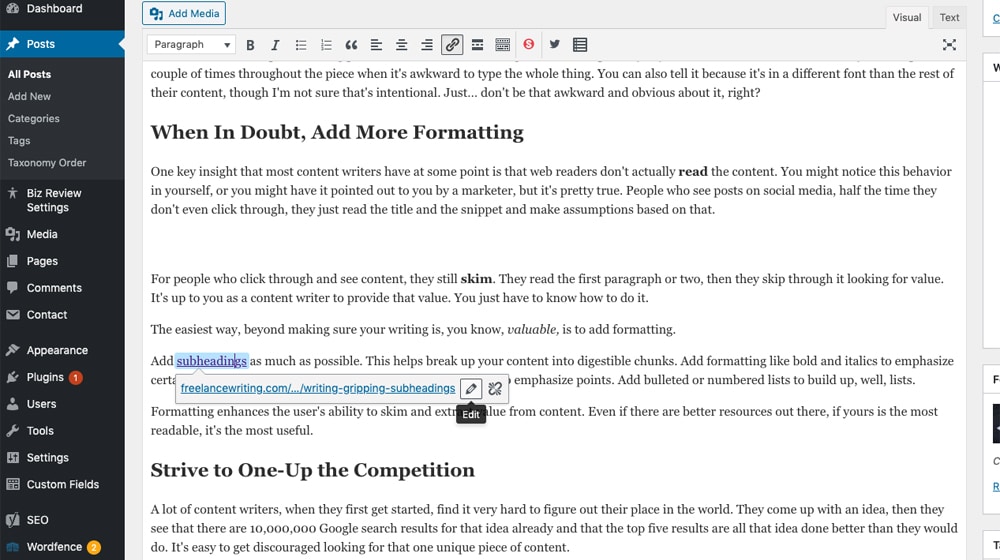
For people who click through and see content, they still skim. They read the first paragraph or two, then they skip through it looking for value. It's up to you as a content writer to provide that value. You just have to know how to do it.
The easiest way, beyond making sure your writing is, you know, valuable, is to add formatting.
Add subheadings as much as possible. This helps break up your content into digestible chunks. Add formatting like bold and italics to emphasize certain points. Add gaps in between paragraphs and sentences to emphasize points. Add bulleted or numbered lists to build up, well, lists.
Formatting enhances the user's ability to skim and extract value from content. Even if there are better resources out there, if yours is the most readable, it's the most useful.
Strive to One-Up the Competition
A lot of content writers, when they first get started, find it very hard to figure out their place in the world. They come up with an idea, then they see that there are 10,000,000 Google search results for that idea already and that the top five results are all that idea done better than they would do. It's easy to get discouraged looking for that one unique piece of content.
I'm here to tell you that you don't need to be unique to be valuable. This article you're reading right now? Dozens of other people have written other articles on the same topic, some of the same points, and some with other tips and hints as well:
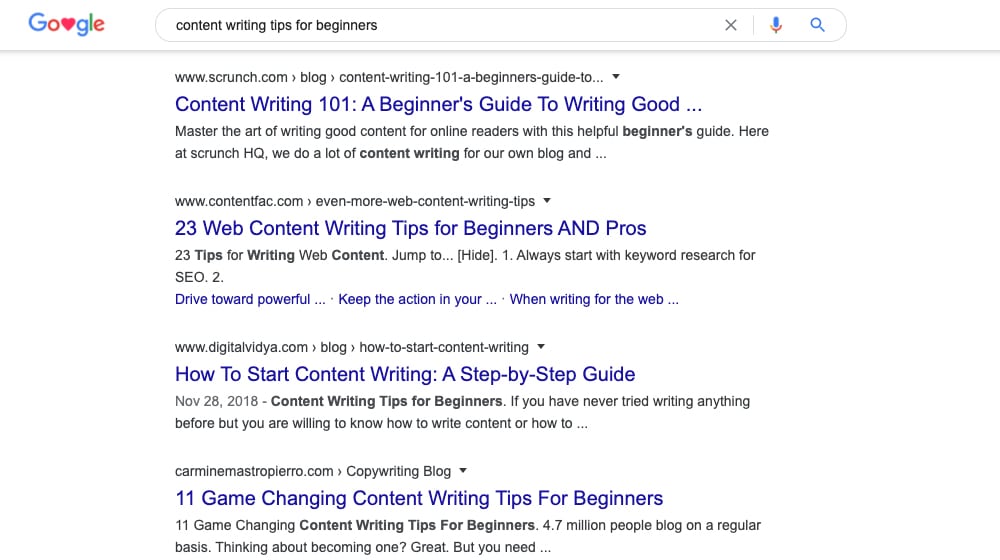
Here's what you do. You find something that already exists, and you do it better.
There are three main ways you can out-do existing content.
- Take content that is broad but shallow, and add depth to it. This involves more research, more data sources, and more critical thinking to find conclusions the data leads you to.
- Take content that is narrow but deep, and add breadth to it. A deep dive into one subject in one industry is narrow, but it's an opportunity to tie another related subject or another industry into it.
- Take content that is old and make it up to date. A lot of old content these days is kept up to date by the initial author, but if it's left abandoned, you can try to supersede it by writing the same basic content with newer information.
Keep in mind that when I say "do what they do" and "you don't have to be unique", I absolutely do NOT mean you can just copy their content. You still have to write unique and original content, but you can cover the same topics and similar points.
Don't Be Afraid of Tools
I've known a lot of writers over the years who pride themselves on their precise knowledge of technical grammar, and who end up focusing more on their grammatical accuracy than on the quality of their content.
To me, this is hilarious. You're priding yourself on a skill that is easily replaced by a free online tool.
With the rising popularity of AI tools like ChatGPT, there are tons of content and blog writers that can help generate outlines, blog topics, and provide inspiration for your own writing.
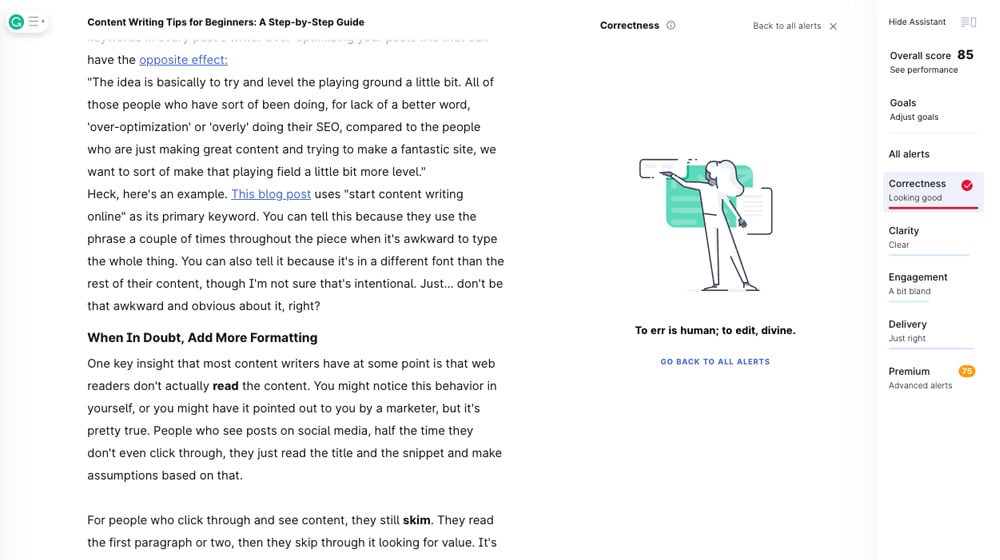
Don't be afraid to use the tools you have at your disposal. Use a spelling and grammar check. Crank up the settings in MS Word. Use keyword research and topic ideation tools.
Here are some of my favorite tools:
- Ahrefs. I wrote a good breakdown of Ahrefs and similar tools.
- Grammarly. Proofreading and grammar checking is super important. If you run a WordPress site, you can even embed Grammarly into your site automatically.
- Clearscope. Clearscope can help you find opportunities to improve your content. I use it to help me discover things that I may have missed, as well as easy opportunities to include relevant keywords. I wrote a guide comparing Clearscope and Marketmuse here.
- WordPress plugins. There are a lot out there; here are some of my favorites, as well as a seperate guide for PageSpeed plugin recommendations.
There are tons of tools out there to help you be a better content writer, and there's absolutely no shame in using them.
Finish With a Proofread
When you finish any given piece of writing, go through it with a fine-toothed comb looking for errors. I know I just told you that tools can do a lot of that for you, and that's true. I make a lot of typos and minor grammatical errors as I type, and you know what? I have a few different autocorrect rules in place to fix them for me. Until you develop your own library or process, make sure you're proofreading everything.
Now and then an error will slip through. That's fine. If you notice it, fix it. If someone else notices it, fix it. If no one notices it, it's not really going to do you any harm. Even still, it's important to get a proofread in on your content before you finalize it and publish it.
Develop a Style
Over time, as you write, you can develop a style. That style will develop naturally, as you find your voice. You find the way you like to express your ideas. The way you like to use lists and formatting. The perspective you use to cover various topics and make analogies. Your style is built up over the years and it comes about from experience.
Your style will also change over time. After you've been writing content for a year or two, if you go back and look at the early content you've written, it will read like something written by someone else entirely. Don't worry; an evolving style is perfectly fine. Developing a style that's unique to you is the important part.
Keep at it. Content writing is a long-term investment, and it's a skill that never stops improving. The more you keep going, the better you'll become.



 30 Second Summary
30 Second Summary



August 12, 2020
Hi James, this was super helpful! I've read a lot of guides besides yours and yours is the only one that left me with some takeaways that I can actually use. I didn't realize how important (and also un-important!) keywords were, and your Grammarly screenshot inspired me to try it out. I'll also be way more mindful of who has already written about a subject before I start writing, that's something I haven't really done before, at least, not in a detailed way. Thanks again!
August 12, 2020
Hey Faeeza, thank you for the very kind words!
This post was aimed at beginners, if you're interested in reading more, we have a handful of other posts you might find useful/interesting in our "Blogging" category: https://www.contentpowered.com/blog/category/blogging/
Topic ideation and competition research are easily the two biggest overlooked things when it comes to beginners and blogging - master those two things and you'll be far ahead of the curve!
August 30, 2020
I have been using the inverted pyramid approach to my writing style as it’s more easier to write long form content with this tactic and I can easily formulate my subheadings.
August 30, 2020
Hi Sonny, thanks for sharing with us! It's good to know what's working for others. I think the fundamentals of the inverted pyramid are sound, if the bulk of your content is legitimately useful and actionable information, then your content is already off to a good start.
October 05, 2020
Hi James,
This helped me a great deal, just wanted to say thank you. You really know your stuff with blogging. I'll be reading your other articles too.
October 05, 2020
Thanks for stopping by Nur and for the kind words!
January 08, 2021
Hi James
Your post helped me a lot. Thank you for this amazing work. God bless you more.
January 08, 2021
Hey Adila, you're very kind, thanks for that! Very happy it helped you.
March 07, 2021
Hey,James. This is my first time going through an actual content writing beginner tips article, as I am thinking to start writing online. Thanks for giving me some valuable pointers which I will keep in mind when I find my interest. No, I will no be doing this,initially, for money (but money is required to sustain, right?) but to search where my interest lies. Baby steps!! Wish you good luck 🤞, from India.
March 12, 2021
Hey Ipsa - thanks for hopping on live chat with me, and I'm very happy this helped you out!
Revenue certainly helps. Being able to hire people to help you grow your blog will amplify your results, and it's hard to do that without any cashflow.
That's what's so great about blogging - you can bootstrap it at first until you're up and running. If you can give your readers enough value, customers will usually follow. It's a great way to draw people into your orbit.
March 09, 2021
This is never an easy job! Besides putting in the actual work, you need to have passion, patience, and time otherwise you’ll give up. I remember back in the day that I was on the verge of dropping my blog completely, and I did pause for a bit. A few months later my traffic was skyrocketing, all organic traffic to my blog posts. That has made me a believer ever since. It just takes a while to start working, but once it does it goes HARD.
March 12, 2021
Hey Matt, thanks for your comment!
This sounds similar to my story - my first blog was over 10 years ago for a free flash game site. It had ads on it and was making a few hundred bucks a week, so I started reinvesting that into the content. I probably did a dozen or so blog posts, waited a month, then gave up.
A year or so later, they were the highest traffic pages on my site and were generating the lion's share of my AdSense revenue. I sold the site shortly after, but I think that's what made me a believer in blogging as well. It does require a good deal of patience and putting love into your content, not rushing it or skimping out. Man, Google's algorithm has really changed a lot since then, as has WordPress.
What brings you here today, just brushing up on the basics? 🙂
May 19, 2021
This is a great post. I appreciate your skills. Thanks for sharing.
May 19, 2021
Thanks Frisco! I appreciate it, glad it helped you.
May 24, 2021
Hi James! Your article is superb. I love it. It helped me a lot.
May 24, 2021
Hey Fatima, really appreciate it! I'm happy it helped you 🙂
November 28, 2021
Hi james, thank you so much. The article has really helped me alot
November 29, 2021
Love to hear it! Thanks, Brenda!
June 04, 2021
Hi James, i just started learning how to write articles. But it is not an easy task. Your article is good and gave some nice information.
June 04, 2021
Hey Pankaj!
I really appreciate that, thanks for taking the time to say that. It makes writing these worth it.
Keep it up, if there's anything I can do to help point you in the right direction, please let me know!
June 06, 2021
Thank you so much! You've actually encouraged me to give content writing a try. This is really helpful.
June 07, 2021
Hey Ginnie! That was my goal, so I'm very happy to hear that. Thanks for stopping by and good luck!
July 07, 2021
Hi James,
Thank you so much. It very helpful. I am very interested in content writing but the area that I have passion in is what I can't figure out, I think will give a try.
Thanks
July 08, 2021
Thanks Peter! Good luck 🙂
July 12, 2021
Hey Mr James,
Nice article especially for beginners like me...
Hope to hear more from you.
July 12, 2021
Hey Ezekiel, thanks for the kind words and for stopping by! I hope it convinced you to start a blog of your own 🙂
July 29, 2021
Awesome post, simple and informative. I liked this line,
“Keep Tone, Voice, and Perspective Consistent”.
Super important to succeed in this, if articles are boring to read it's hard for anyone to be fulfilled.
But it was nice to read this. Thanks for writing this useful content.
July 31, 2021
Thanks for the comment, Mohammad!
I couldn't agree more. Thank you for your words of encouragement.
January 30, 2022
Super effective, practical, and easy to apply / follow article.
I love your simple yet powerful writing style. It seems you are taking a live class!
I recommended your link to at least 15 people. They are all so grateful! I, too, am fascinated.
You are a trustworthy, excellent content writer and mentor. Thanks from the heart.
January 31, 2022
Thanks Ahmed!
Wow, that means a lot.
Thank you for your heartfelt comment on my post, and I'm so happy it's helping to make a positive difference.
This is why I do what I do 🙂
March 13, 2022
Thanks, James.
Your post was helpful and detailed. It helped to clear a lot of concepts for me.
March 15, 2022
You're welcome, Suhail!
March 28, 2022
I'm really impressed and happy with these tips! You are a great mentor!
March 31, 2022
Thanks Oluwasola! That's very kind of you to say.
April 07, 2022
waoh, this is very informative, guess I've found what I've been waiting for to become a content writer. Thanks a million James Parsons.
April 07, 2022
Thanks, Ruth! Love to hear it.
August 25, 2022
Thanks, James. I'm just about to start content writing and your article was the first I have read. It really feels like I'm in it already, and I hope the tips grabbed would do me much help in my pursuit.
Please, if you have more articles for a total beginner like me, I would appreciate it.
Thanks many times🙏
September 01, 2022
Thanks Olivia, love to hear it!
Here's are a couple of articles that I recommend next:
https://www.contentpowered.com/blog/blog-optimization-tips-seo/
https://www.contentpowered.com/blog/tips-beat-competitors-seo/
This is a great one too; small changes to your user experience are reflected across all of your pages and will help your site perform better overall:
https://www.contentpowered.com/blog/improve-user-experience-website/
Feel free to reach out any time if you need pointing in the right direction 🙂
March 11, 2023
Amazing blog article!
March 11, 2023
Thank you!
April 26, 2023
Hey James,
I retired from my job a couple of years back. Did try my hand at a couple of things. But always wondered what do I do with some exclusive work experience I gained during my employment. Then it struck me that I should start writing a blog and discuss various aspect of the commodity I worked on during my job. I saw many YouTube videos on how to write blogs and also read many online articles available on the net, as mentioned by you. Honestly, found your article to be very crisp and clear. I will surely follow your guidelines and start reading/researching/writing earnestly.
Thank you very much James.
April 29, 2023
Hi Uday!
Absolutely. It's incredible what reach blog articles have on the internet, even on subjects that you wouldn't think would get much traction.
In some cases, ESPECIALLY on subjects you think wouldn't get much traction.
My best advice is focus on having a great website and try to create content that is 10x better than anybody else. Do that, stick with it for years, and you'll be rewarded!
The reason most people's blogs fail is because they think they are creating great quality content, but aren't. Or, they don't stick with it long enough. Knowing that will help you succeed.
It's hard work, but it's rewarding and well worth it.
April 26, 2023
Hey James! Thanks for the Guide. Which is better for blogs in your opinion?
April 29, 2023
Hey Steve!
I'm a sucker for WordPress.
It doesn't get much better than WordPress for internal/external link management, optimization, SEO, custom development, automation, etc.
April 27, 2023
Nice Article
April 29, 2023
Thank you!
May 16, 2024
Hi James! Your content is top notch. I have learn't a lot through this site
May 23, 2024
Thank you Chris, I appreciate it!